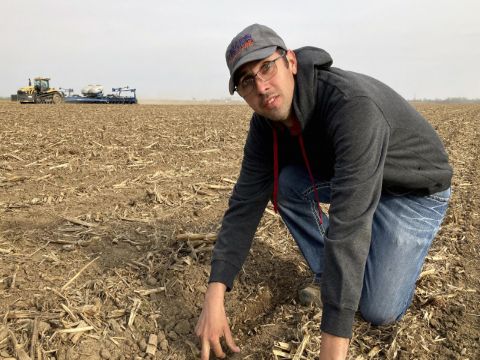Those privileged of having met their grandparents, or even better, their great-grandparents, know of the staggering improvements in human prosperity over the last 100 years. For those born into wealth it’s noticeable through the advances of modern medicine (allowing you to meet your great-grandparents in the first place), but the changes are even more breathtaking for those whose ancestors have a background in farming.
In fact, most of our ancestor’s stories relate to farming. European immigrants to the United States are often referred to as “seeking a better life”, but the harsher reality is that in most of Europe famine and disease was haunting those living from day to day. The Irish famine of 1845 killed one million people, which at the time represented 15% of the total population. About a century before the mainstream introduction of fungicides, the farming population had no ability to fight potato blight – leading to famines across Europe which caused civil unrest, even toppling the French July Monarchy in the Revolution of 1848.
We have come a long way since then. In the 1950s pesticides became popularised, considerably increasing the prosperity and job security of farmers. It also improved food safety and food security for all consumers, allowing farmers to expand, mechanise and branch out.
Meanwhile, best practices of how to use pesticides have consistently improved. Since 1960, pesticides use per acre has been reduced by 40%, pesticide persistence has been cut in half, and the amount of active ingredient reduced by 95%. As farmers upgrade their modern technological equipment, through tools such as smart sprayers, we’ll see an ever greater precision in how to use crop protection.
We would be remiss to ignore the positive effects that modern crop protection has had for us. Without pesticides, crop losses would be between 50 and 80%, which in turn would lead to higher food prices, and shortages leading to queues in front of supermarkets the likes we only experience in times of crisis.
Herbicides have played a particularly important role in improving the lives of farmers. Farmers in developing nations are still heavily reliant on hand-weeding, which in general, but especially in certain climates, is back-breaking and excruciating manual labour. The rural exodus in sub-Saharan Africa for instance increases the need for weed-killers. The use of herbicides doesn’t only fight off the persistent variety of 30,000 weed species that affect farms, but it also alleviates the burden on women and all too often children who are required to hand-weed. In fact, 80% of hand-weeding in Africa is done by women, and 69% of farm children between the ages 5-14 are forced to leave school to work in the agricultural sector during peak weeding periods, leading to long-term spinal deformities.
It’s the reason why, in 2004, California banned hand-weeding on farms altogether. Curiously, organic farming which relies on hand-weeding has been exempt from this rule, presuming somehow that back injuries don’t affect farmers if they sell to organic shops.
Our history of farming ought to be a cautionary tale of how it used to be, and what we don’t want to go back to. Unfortunately, environmental organisations are supporting a “back to basics” approach to agriculture, by supporting production methods such as “agro-ecology”, which reject the notion of using pesticides altogether. They do so by challenging crop protection tools, even after they passed rigorous safety testing. In the long-run, this will undermine the advantages of modern farming, and consumers at risk, not just by reducing the availability of their products, but by failing to guarantee the safety of the food they consume.
How consumers eat should be up to them. If consumers prefer organic food, or even just something they bought from a neighbourhood farmer’s market, out of the garden of an acquaintance, that is their prerogative. However, we should not pretend that those consumers who buy conventional food products have moved away from the “healthy” or the “natural” – not only is that untrue, it is also an underappreciation of what modern farming has done to improve the lives of farmers and consumers alike.
Wirtz is the senior policy analyst at the Consumer Choice Center, focusing on new technology, agriculture, trade, and lifestyle regulations. He recently published “No Copy-paste: What not to Emulate from Europe’s Agriculture Regulation.”


